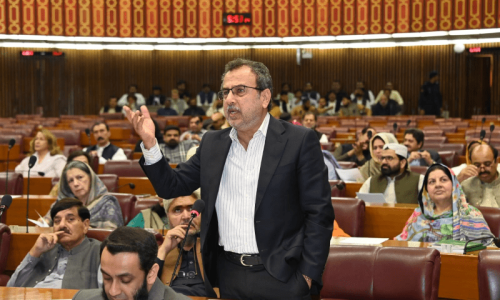KARACHI: As the number of dog-bite deaths across Sindh reaches to 11, Pakistan has been facing an immense shortage of anti-rabies vaccine (ARV) by some 800,000 dosages amid a growing population of stray dogs and almost non-existence of facilities in the rural parts of Sindh to face the challenge, it emerged on Sunday.
Though the health practitioners and officials believe that the entire country was running short of the ARV, the situation in Sindh is turning worst as in Karachi alone more than 150 dog-bite cases are being reported to major city hospitals on a daily basis and no move is seen on ground for the prevention of the menaces and control of the population of stray dogs in the metropolis and rural areas of the province.
“An 11-year-old boy, Kashif Sohrab, suffering from rabies was brought from Thatta to our hospital last week and died within hours,” Jinnah Postgraduate Medical Centre’s Executive Director Dr Seemin Jamali said. “No immunisation was done and he was bitten by a stray dog a month ago in the shoulder. It’s such a terrible death and this is what happened when people are not aware. There is also a shortage of vaccines, which makes the situation more depressing. There should be a collective effort for a rabies-free Sindh.”
A total of 11 people have so far died in Sindh after bitten by stray dogs
A source privy to the current developments said the country was facing a shortage of at least 800,000 dosage of ARV as conveyed by the federal authorities to the health experts in Karachi.
69,000 dog-bite cases in Sindh in 2019
The data suggests further deepening of the crisis in Sindh, where total 11 people have died so far this year in more than 69,000 dog-bite cases.
“So far in 2019 we have received 6,000 cases of dog bite and recorded six deaths due to rabies in Karachi alone. Last year, we registered more than 7,500 patients of dog bites and the number of death stood at nine. This year’s figures have already surpassed last year’s data within six months,” said Dr Jamali.
Data compiled by the Sindh health authorities indicates an alarming situation. According to the data, 69,453 dog-bite cases have so far been reported in different parts of the province in 2019 alone.
“We have been treating 30 to 40 dog-bite cases daily,” said Dr Naseem Salahuddin, head of infectious diseases at the Indus Hospital. “As anti-rabies vaccine is not available anywhere in the interior of Sindh, cases from rural parts of the province are also referred to Karachi’s major hospitals. Only last month an eight-year-old boy from Shikarpur was brought to our hospital. He was suffering from rabies encephalitis but could not survive despite our efforts.”
The hospitals blame a severe shortage of the ARV in the country as a major reason preventing proper treatment of the victims. The people associated with the vaccine imports point out reasons for the shortage.
‘A worldwide crisis’
“There is a worldwide crisis regarding the availability of anti-rabies vaccine after the ones produced by China were not found meeting the safety concerns,” said Usman Ghani, a vaccines importer. “In the absence of Chinese vaccine, India became the only country to fill the gap. However, these days India is unable to meet their own demand so they have cut the ARV exports to other countries, including Pakistan.”
He said that the situation demanded immediate moves from the government to meet the challenge.
The officials agree with the concerns over shortage of vaccines, which is a common problem being faced by the country hospitals, but what worry them most in Sindh is the rise in population of stray dogs.
The ever-increasing population of stray dogs have been constantly pushing the number of dog-bite victims, mainly children, even in Sindh’s urban areas.
“The authorities concerned should take immediate measures to make Sindh rabies-free and devise a comprehensive policy. It is so unfortunate that children are the major victims of stray dogs, both in urban and rural Sindh. If we don’t move now it can become a much larger challenge in the days to come,” said Dr Jamali.
Published in Dawn, July 1st, 2019















































